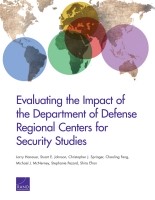| 来源类型 | Research Reports
|
| 规范类型 | 报告
|
| ISBN | 9780833085139
|
| 来源ID | RR-388-OSD
|
| Evaluating the Impact of the Department of Defense Regional Centers for Security Studies |
| Larry Hanauer; Stuart Johnson; Christopher Springer; Chaoling Feng; Michael J. McNerney; Stephanie Pezard; Shira Efron
|
| 发表日期 | 2014
|
| 出版年 | 2014
|
| 页码 | 186
|
| 语种 | 英语
|
| 结论 |
Regional Centers (RCs) Build Partner Capacity- RCs impart fundamental national security analysis skills.
- RCs help build partner nation institutions.
- RCs develop future partner nation leaders.
- RCs promote whole-of-government solutions to security issues.
RCs Build Relationships and Foster Pro-U.S. Outlooks- RCs shape partners' long-term strategic thinking on security issues.
- RCs build relationships that facilitate U.S. engagement.
- RCs promote policies consistent with U.S. priorities.
- RCs expose partner nations' current and future leaders to U.S. government, values, and policies.
RCs Offer Unique Opportunities for Engagement- RCs have "convening authority."
- RCs "show the U.S. flag" and demonstrate U.S. commitment.
- RCs can engage audiences that the Office of the Secretary of Defense and the combatant commands cannot.
- RCs are a critical engagement tool in "economy of force" regions.
- RCs offer unique openings to countries under U.S. sanctions.
- RCs engage military establishments even when broader bilateral relationships are strained.
- RCs can be used as "baby steps" for engaging security establishments when no military-to-military relations exist.
- RCs can overcome diplomatic barriers and bureaucratic boundaries.
- RCs can nimbly shift to cover new issues.
- RCs help U.S. officials understand partner nations' views.
RCs Promote Regional Dialogue that Reduces Tensions- RCs promote regional dialogue and cooperation.
- RCs facilitate U.S. multilateral engagement.
- As neutral venues, RCs can host or contribute to regional confidence-building measures.
RCs Serve as Repositories of Regional Expertise- RCs provide valuable expertise to stakeholders.
- Academic research adds value for stakeholders and partners.
- RCs fill gaps in education for U.S. government personnel.
RCs Collect Insufficient Data to Assess Program Effectiveness Adequately- RCs collect limited data on the impact of their programs on U.S. policy objectives.
OSD Has Several Options for Increasing Impact and Cost-Effectiveness- Options to consider for greater future impact include deciding whether to rebalance the RC enterprise toward Asia to support the "pivot" or toward other regions to complement it, evaluating the balance between core residential courses and in-region workshops, determining whether and to what extent the centers should pursue outside funding, and assessing the benefit of expanding participation of international organizations and nongovernmental organizations in RC programs.
- Options to consider for cost savings include cutting overhead, cutting core programs, scaling back core programs, seeking further operating efficiencies, reorganizing the RC enterprise, and pursuing burden-sharing.
|
| 摘要 |
- The Office of the Secretary of Defense (OSD) should support the regional centers' (RCs') continued efforts to build partner capacity, develop bilateral relationships, and promote regional dialogue and security cooperation.
- The RCs should improve their collection and analysis of data regarding program effectiveness, particularly regarding the impact of RC programs on specific policy objectives. The RCs should consider new tools for collecting data on program effectiveness.
- OSD and the combatant commands can improve their oversight and management by issuing written guidance in a timely fashion so that centers can adjust their programs, assessing the RCs' responses to stakeholder taskings on an ongoing basis, identifying and applying best practices, and focusing academic research on stakeholder priorities.
- OSD should keep the RCs focused on regional security challenges rather than refashion them to address specific transnational threats.
|
| 主题 | Global Security
; Military Strategy
; Program Evaluation
; Security Cooperation
; United States
|
| URL | https://www.rand.org/pubs/research_reports/RR388.html
|
| 来源智库 | RAND Corporation (United States)
|
| 资源类型 | 智库出版物
|
| 条目标识符 | http://119.78.100.153/handle/2XGU8XDN/107682
|
推荐引用方式
GB/T 7714 |
Larry Hanauer,Stuart Johnson,Christopher Springer,et al. Evaluating the Impact of the Department of Defense Regional Centers for Security Studies. 2014.
|
|
文件名:
|
x1495315141257.jpg
|
|
格式:
|
JPEG
|

|
文件名:
|
RAND_RR388.pdf
|
|
格式:
|
Adobe PDF
|
除非特别说明,本系统中所有内容都受版权保护,并保留所有权利。